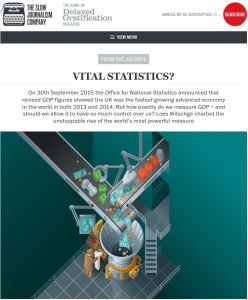Join getAbstract to access the summary!

Join getAbstract to access the summary!
Loes Witschge
Vital Statistics?
The Slow Journalism Company, 2015
What's inside?
Gross domestic product (GDP) is an inadequate measure of society’s progress. But what will replace it?
Recommendation
Gross domestic product (GDP) has long been the go-to statistic for assessing a country’s economic achievement. In recent years, however, many economists have grown critical of the metric’s ability to take an accurate pulse of society’s well-being. They have sought to develop more comprehensive indices, particularly ones that gauge citizens’ well-being instead of production. getAbstract recommends freelance journalist Loes Witschge’s clear, concise and jargon-free navigation of this important economic concept to anyone seeking more nuanced and holistic ways to measure a society’s well-being.
Summary
About the Author
Loes Witschge is head of digital at Delayed Gratification, the quarterly magazine from Slow Journalism.

















Comment on this summary